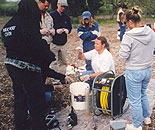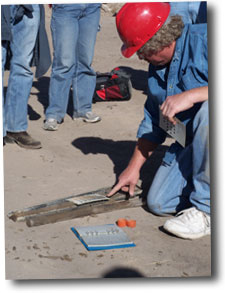 Gillian Nielsen is Vice President of Nielsen Ground-Water Science, Inc. the parent company of The Nielsen Environmental E-School and The Nielsen Environmental Field School.
Gillian Nielsen is Vice President of Nielsen Ground-Water Science, Inc. the parent company of The Nielsen Environmental E-School and The Nielsen Environmental Field School.
She is also Chairman of the International Certification Program for Environmental Samplers and Specialists. She has 36 years of International experience as an environmental and ground-water consultant and trainer. During her professional career she has developed, managed and implemented ground-water monitoring and sampling programs, soil gas monitoring investigations, multimedia environmental sampling programs, RCRA compliance audits, environmental site assessments and remediation programs at hazardous and non-hazardous waste sites in the U.S. and Canada. She has also played a key role in the development and management of corporate standard operating procedures as well as health and safety procedures and policies.
Gillian specializes in developing and instructing a wide variety of field practice-oriented training programs for private industry, consulting firms, state and Federal regulatory agencies, universities, professional and trade associations. She has lectured extensively and taught hundreds of field courses on the topics of ground-water monitoring and sampling, environmental sampling and field sample analysis, design and implementation of soil gas investigations and RCRA compliance throughout the U.S. as well as Canada, England, Guatemala, Mexico and Australia. Gillian also conducts 8-hour health and safety refresher training courses for clients across the U.S. who are involved in environmental contamination investigation and remediation projects. In addition to training, she works closely with industry and consulting firms as a consultant conducting audits of field investigation activities, negotiating with PRPs and regulatory agencies, developing corporate standard operating procedures and health and safety plans and providing technical reviews of site investigation reports. She also works closely with environmental instrumentation companies in the evaluation of new equipment and in development of new instrumentation.
Gillian was a 16-year member of the Editorial Board of Ground-Water Monitoring and Remediation and a member of the ASTM Subcommittee D-18.21 task group on ground-water sampling. She is the recipient of Ground Water Publishing Company's Outstanding Service Award for her work on the editorial board of the journal Ground-Water Monitoring and Remediation and has received several Standards Development Awards from ASTM. She has authored a number of scientific papers and written many ASTM Standards dealing with ground-water sampling, soil-gas monitoring, field analysis of environmental samples, and field decontamination procedures, and was a contributing author for first (1991) and second (2006) editions of The Practical Handbook of Environmental Site Characterization and Ground-Water Monitoring as well as Technical Guidance on Low-Flow Purging and Sampling and Minimum- Purge Sampling (2002). She is also a co-editor and contributing author of the text The Essential Handbook of Ground-Water Sampling, published in January 2007. Gillian frequently provides technical reviews of state and Federal regulatory agency technical guidance documents. Gillian holds B.Sc. degrees in geography (hydrology) and biology (aquatic) from Trent University in Peterborough, Ontario Canada.
 David M. Nielsen is President of Nielsen Ground-Water Science, Inc., the parent company of The Nielsen Environmental E-School and The Nielsen Environmental Field School. He is a Certified Professional Geologist (AIPG #5040), a Professional Hydrogeologist (AIH #991), a Certified Ground-Water Professional (AGWSE #179) and a Certified/Licensed/Registered Professional Geologist in 7 states (AK, AR, DE, FL, IN, SC, TX). He has 39 years of experience in ground-water and environmental consulting, training and research. He has managed ground-water contamination investigations, environmental site assessments, ground-water monitoring and sampling programs, petroleum hydrocarbon spill investigations and remedial projects across the U.S. David was one of the primary instructors for Princeton Groundwater's Groundwater Pollution and Hydrology Course for 12 years, and he has also developed curriculum for and instructed: undergraduate, graduate and continuing education courses in ground-water science at Wright State University; Technology Transfer workshops on Environmental Site Characterization and Ground-Water Monitoring and Sampling for the U.S. EPA; and Waste Management, Inc.'s Landfill University; and a one-year Hydrogeologic Training Program for the Environmental Response Division of the Michigan Department of Environmental Quality. He has instructed more than 500 ground water and environmental science short courses and workshops for consulting firms, regulatory agencies, industrial concerns, the Department of Defense, the U.S. EPA, trade and professional organizations, educational institutes and universities in the U.S., England, Canada, Australia, Guatemala and Mexico.
David M. Nielsen is President of Nielsen Ground-Water Science, Inc., the parent company of The Nielsen Environmental E-School and The Nielsen Environmental Field School. He is a Certified Professional Geologist (AIPG #5040), a Professional Hydrogeologist (AIH #991), a Certified Ground-Water Professional (AGWSE #179) and a Certified/Licensed/Registered Professional Geologist in 7 states (AK, AR, DE, FL, IN, SC, TX). He has 39 years of experience in ground-water and environmental consulting, training and research. He has managed ground-water contamination investigations, environmental site assessments, ground-water monitoring and sampling programs, petroleum hydrocarbon spill investigations and remedial projects across the U.S. David was one of the primary instructors for Princeton Groundwater's Groundwater Pollution and Hydrology Course for 12 years, and he has also developed curriculum for and instructed: undergraduate, graduate and continuing education courses in ground-water science at Wright State University; Technology Transfer workshops on Environmental Site Characterization and Ground-Water Monitoring and Sampling for the U.S. EPA; and Waste Management, Inc.'s Landfill University; and a one-year Hydrogeologic Training Program for the Environmental Response Division of the Michigan Department of Environmental Quality. He has instructed more than 500 ground water and environmental science short courses and workshops for consulting firms, regulatory agencies, industrial concerns, the Department of Defense, the U.S. EPA, trade and professional organizations, educational institutes and universities in the U.S., England, Canada, Australia, Guatemala and Mexico.
David is former Chairman of ASTM Subcommittee D-18.21 on Ground-Water and Vadose Zone Investigations, a consultant to the U.S. EPA Science Advisory Board, a member of the U.S. Department of Defense SERDP/ESTCP Peer Review Panel, and an advisor to the U.S. Department of Energy National Advanced Drilling and Excavation Technology Program. He is the editor and a contributing author for The Practical Handbook of Environmental Site Characterization and Ground-Water Monitoring (First and Second Editions; 1991 and 2006), The Essential Handbook of Ground-Water Sampling (2007) and Technical Guidance on Low-Flow Purging and Sampling and Minimum-Purge Sampling (2002). He is also an active member of AIPG, the Association of Ground Water Scientists and Engineers, the American Institute of Hydrology and the Association of Engineering Geologists. He served for 12 years as Editor of Ground-Water Monitoring and Remediation and served for 12 years on the Wright State University Geology Department's Board of Counselors. He holds B.A. and M.S. degrees in geology from Miami University (1974) and Bowling Green State University (1977) respectively. Prior to co-founding the Nielsen Environmental Field School and Nielsen Ground-Water Science, Inc., he managed regional offices for two geoscientific and engineering consulting firms, served as director of research and education for the National Ground Water Association and worked for state environmental agencies in Massachusetts, West Virginia and Ohio.
David has also written guidance documents on direct-push technology and ground-water sampling for the U.S. EPA Superfund program, and reviewed dozens of technical reports for the U.S. EPA's Environmental Technology Verification (ETV) program. He is the recipient of the Outstanding Service Award of the Association of Ground Water Scientists and Engineers, The Outstanding Achievement Award of ASTM, and a 4-time recipient of ASTM's Special Service Award.
